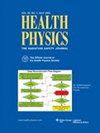A Revised System of Radiological Protection Is Needed.
IF 1
4区 医学
Q4 ENVIRONMENTAL SCIENCES
引用次数: 0
Abstract
The system of radiological protection has been based on linear no-threshold theory and related dose-response models for health detriment (in part related to cancer induction) by ionizing radiation exposure for almost 70 y. The indicated system unintentionally promotes radiation phobia, which has harmed many in relationship to the Fukushima nuclear accident evacuations and led to some abortions following the Chernobyl nuclear accident. Linear no-threshold model users (mainly epidemiologists) imply that they can reliably assess the cancer excess relative risk (likely none) associated with tens or hundreds of nanogray (nGy) radiation doses to an organ (e.g., bone marrow); for 1,000 nGy, the excess relative risk is 1,000 times larger than that for 1 nGy. They are currently permitted this unscientific view (ignoring evolution-related natural defenses) because of the misinforming procedures used in data analyses of which many radiation experts are not aware. One such procedure is the intentional and unscientific vanishing of the excess relative risk uncertainty as radiation dose decreases toward assigned dose zero (for natural background radiation exposure). The main focus of this forum article is on correcting the serious error of discarding risk uncertainty and the impact of the correction. The result is that the last defense of the current system of radiological protection relying on linear no-threshold theory (i.e., epidemiologic studies implied findings of harm from very low doses) goes away. A revised system is therefore needed.需要修订辐射防护系统。
近 70 年来,辐射防护系统一直基于线性无阈值理论和相关的剂量-反应模型,以评估电离辐照对健康造成的损害(部分与癌症诱导有关)。线性无阈值模型的使用者(主要是流行病学家)暗示,他们可以可靠地评估与器官(如骨髓)所受数十或数百纳戈瑞(nGy)辐射剂量相关的癌症超额相对风险(很可能没有);对于 1,000 nGy,超额相对风险是 1 nGy 的 1,000 倍。目前,他们之所以能够接受这种不科学的观点(忽略了与进化相关的自然防御能力),是因为在数据分析中使用了许多辐射专家并不了解的误导程序。其中一个程序就是,当辐射剂量向指定剂量零(天然本底辐射照射)下降时,超额相对风险不确定性会故意消失,这是不科学的。本论坛文章的主要重点是纠正丢弃风险不确定性的严重错误以及纠正的影响。其结果是,依靠线性无阈值理论(即流行病学研究隐含了极低剂量危害的结论)的现行辐射防护系统的最后一道防线不复存在。因此,需要对系统进行修订。
本文章由计算机程序翻译,如有差异,请以英文原文为准。
求助全文
约1分钟内获得全文
求助全文
来源期刊

Health physics
医学-公共卫生、环境卫生与职业卫生
CiteScore
4.20
自引率
0.00%
发文量
324
审稿时长
3-8 weeks
期刊介绍:
Health Physics, first published in 1958, provides the latest research to a wide variety of radiation safety professionals including health physicists, nuclear chemists, medical physicists, and radiation safety officers with interests in nuclear and radiation science. The Journal allows professionals in these and other disciplines in science and engineering to stay on the cutting edge of scientific and technological advances in the field of radiation safety. The Journal publishes original papers, technical notes, articles on advances in practical applications, editorials, and correspondence. Journal articles report on the latest findings in theoretical, practical, and applied disciplines of epidemiology and radiation effects, radiation biology and radiation science, radiation ecology, and related fields.
 求助内容:
求助内容: 应助结果提醒方式:
应助结果提醒方式:


